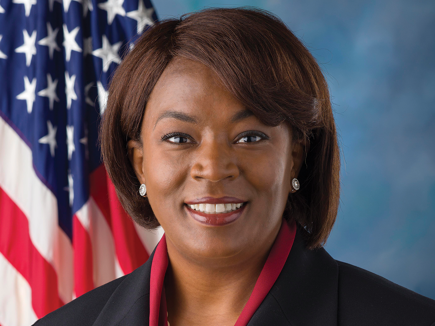Carla Cotwright-Williams
U.S. Social Security Administration (SSA)
Baltimore, Maryland
Department: Office of Information Security, Security Integrity Center
Education: B.S. Mathematics, 2000, California State University-Long Beach; M.S. Mathematics, 2002, Southern University and A&M College; M.S. Mathematics, 2004, and Ph.D. Mathematics, 2006, University of Mississippi; Graduate Certificate in Public Policy Analysis, 2010, Old Dominion University
Career stage: Mid—17 years post Bachelor’s

What She Does
As an IT fellow, Carla has supported efforts to develop analytics to aid in the prevention and mitigation of fraud; worked on the product management team supporting the launch of SSA’s Enterprise Data Warehouse; and most recently, she’s worked with SSA’s Analytics Center of Excellence to solve the agency’s diverse business problems using analytics. In her current rotation, she is working to develop analytics to help prevent financial cyber crime.
Her position is a rotational leadership development fellowship for persons with advance degrees in fields related to Information Technology. From her academia experience, she is keenly aware of the many connections between mathematics and computer science—she likes to say “mathematics is the language of computers.”
Necessary Job Skills
Applied math and computational science are important to her work because much of what Carla does is related to data and complex systems/processes. Her primary research area was in a branch of combinatorics called matroid theory. The skills she developed over the years provide her with the tools necessary to work with various types of operational challenges—like abstracting key aspects of a process to better understand the root causes of problems—ultimately becoming equipped to solve a variety of business questions.
During one rotation, she recalls developing a model to determine potential cost savings as the result of the implementation of a particular program. She developed a probabilistic model to estimate the savings under a limited set of variables. However, often times, real world problems are not complete, and in this case, time constraints imposed by leadership and other factors prevented having all the information necessary to inform the work. However, models can be updated and tested, as more information is gathered.
Pros and Cons Of Her Job
One thing which she particularly enjoys about her line of work is that she is able to join her mathematical/computational background and policy experience to understand and improve the “big picture.” On the other hand, she has found that overcoming perceptions that mathematicians only do math to be challenging (but not impossible to overcome). She believes the problem solving skills possessed by mathematicians enable them to be effective in many different sectors of work.
Career Path
As an undergrad, Carla was only focused on careers in education/teaching—she expressed she didn’t know anything different. She thought only engineers did engineering work or scientists only did science. Carla quickly discovered mathematics touches so many areas. All types of engineering and science (including social science) use math to answer the most complicated questions in these fields.
Carla was in a tenure track position when she learned about several positions in science policy. She began to take graduate classes in public policy while in her tenure track position and participated in faculty research experiences to broaden her applied mathematical experiences. She decided she wanted to do more outside of the classroom—good teachers are critical, but she wanted to use her math to have a broader impact on society. She found her leadership and technical skills could be used for the public good.
As her career path continues to fall in place, Carla has taken steps to prepare for subsequent stages of her career based on things she has learned about the larger math/science community and the world around us.
Work/Life Balance
Many federal agencies allow flex work hours and telework. Employees utilizing flex hours, complete their 8-hour workday anytime between 6 am and 6 pm with core hours. Also, employees accumulate annual leave hours every paid period.
Career Expectations and Advice
“Get out and talk to people and learn new things!”
Don’t limit yourself to what you see in print. Carla learned about the AAAS Science and Technology Policy Fellowship after attending a conference and meeting a former fellow. Just simply knowing of this program changed the trajectory of her career. In 2012, she was the awarded the American Mathematical Society (AMS-AAAS) Congressional Fellow. This and other opportunities have exposed her to countless traditional and non-traditional careers for mathematicians.
Don’t limit yourself to what you see in print.
Stay Up-to-Date with Email Alerts
Sign up for our monthly newsletter and emails about other topics of your choosing.

